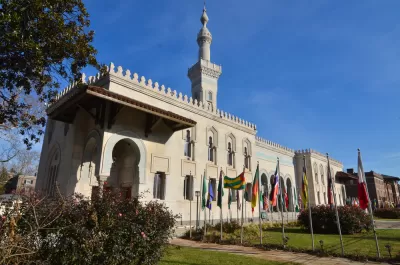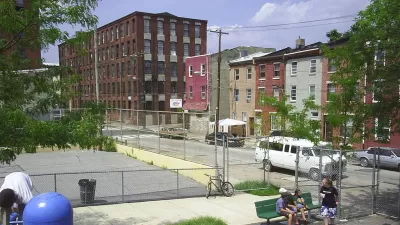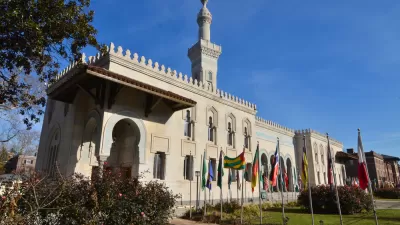As the U.S. Department of Justice takes action to protect the religious freedoms of Muslims in the United States, zoning decisions have proven a particularly common source of anxiety among Muslim communities.

Katie Shepherd reports on the controversy over a proposed mosque project in Bensalem, Pennsylvania. According to Shepherd, a Muslim congregation in the Philadelphia suburb spent ten months "[pleading] with township officials to allow the construction of a mosque, paying for expensive traffic studies, repeatedly explaining Islamic practices, revising and re-revising design plans, and then receiving the final word: No."
The U.S. Department of Justice, however, has charged "that the Bensalem Township zoning hearing board had violated federal religious land-use laws by denying the congregation’s application after it had granted zoning exemptions for other religious construction projects."
More specifically, the township's zoning board had previously granted variances to an Indian Orthodox church, two Hindu temples, and several faith-based private schools, among other religious institutions, according to Shepherd.
The Bensalem case is just one example of a concerted effort by the Department of Justice to protect the rights of Muslims in the United States at a time of heated political rhetoric and global conflict. "The Justice Department has taken up land-use cases like the one in Bensalem, religious discrimination in the workplace and at school, and hate-crime cases, and it has deployed community leaders to educate people on Islam," reports Shepherd.
Accusations of religious discrimination, like the example from Bensalem, are increasing, according to Shepherd. And in some cases, other churches have stood in solidarity with Muslim mosques, recognizing the possibility for one variety of religious discrimination to lead to another.
FULL STORY: Township Saw a Zoning Issue. The Justice Dept. Saw Religious Discrimination.

Trump Administration Could Effectively End Housing Voucher Program
Federal officials are eyeing major cuts to the Section 8 program that helps millions of low-income households pay rent.

Planetizen Federal Action Tracker
A weekly monitor of how Trump’s orders and actions are impacting planners and planning in America.

Ken Jennings Launches Transit Web Series
The Jeopardy champ wants you to ride public transit.

Rebuilding Smarter: How LA County Is Guiding Fire-Ravaged Communities Toward Resilience
Los Angeles County is leading a coordinated effort to help fire-impacted communities rebuild with resilience by providing recovery resources, promoting fire-wise design, and aligning reconstruction with broader sustainability and climate goals.

When Borders Blur: Regional Collaboration in Action
As regional challenges outgrow city boundaries, “When Borders Blur” explores how cross-jurisdictional collaboration can drive smarter, more resilient urban planning, sharing real-world lessons from thriving partnerships across North America.

Philadelphia Is Expanding its Network of Roundabouts
Roundabouts are widely shown to decrease traffic speed, reduce congestion, and improve efficiency.
Urban Design for Planners 1: Software Tools
This six-course series explores essential urban design concepts using open source software and equips planners with the tools they need to participate fully in the urban design process.
Planning for Universal Design
Learn the tools for implementing Universal Design in planning regulations.
Ada County Highway District
Clanton & Associates, Inc.
Jessamine County Fiscal Court
Institute for Housing and Urban Development Studies (IHS)
City of Grandview
Harvard GSD Executive Education
Toledo-Lucas County Plan Commissions
Salt Lake City
NYU Wagner Graduate School of Public Service





























